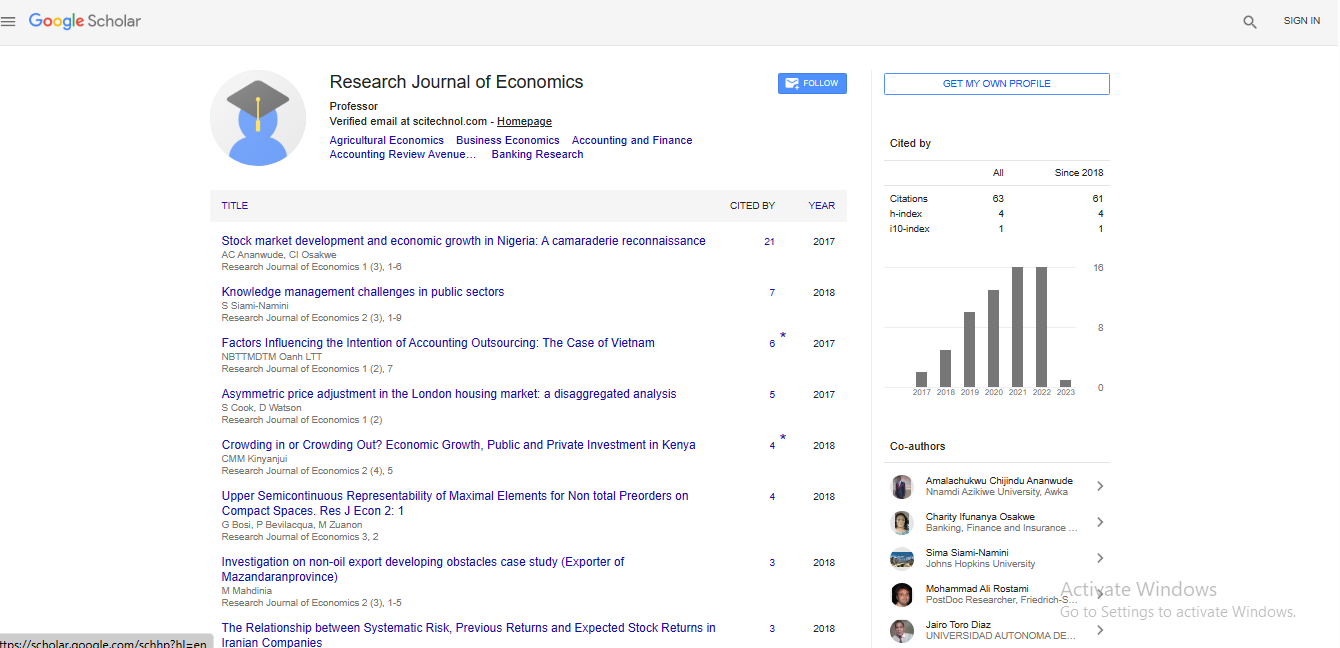Opinion Article, Res J Econ Vol: 7 Issue: 4
Stock Exchanges: Facilitating Capital Markets in the Digital Age
Jafir Bilansh*
1Department of Business, Istanbul Medipol University, Istanbul, Turkey
*Corresponding Author: Jafir Bilansh,
School Of Business, Istanbul Medipol
University, Istanbul, Turkey
E-mail: bjafir@medipol.edu.tr
Received date: 28 June, 2023, Manuscript No. RJE-23-113063;
Editor assigned date: 30 June, 2023, PreQC No. RJE-23-113063 (PQ);
Reviewed date: 14 July, 2023, QC No. RJE-23-113063;
Revised date: 21 July, 2023, Manuscript No. RJE-23-113063 (R);
Published date: 28 July, 2023, DOI: 10.4172/RJE.1000163
Citation: Bilansh J (2023) Stock Exchanges: Facilitating Capital Markets in the Digital Age. Res J Econ 7:4.
Description
The stock exchange is a pivotal institution in the global financial landscape, facilitating the trading of securities and playing a crucial role in capital formation, liquidity provision, and price discovery. Stock exchanges serve as marketplaces where buyers and sellers trade financial instruments, primarily stocks, in a regulated environment. Their evolution has mirrored the progression of financial markets and innovations in technology. The first stock exchanges emerged in the 17th century, with the Amsterdam stock exchange and the London Stock Exchange setting the foundation. Stock exchanges proliferated worldwide in the 19th and 20th centuries, including the New York Stock Exchange (NYSE), Tokyo Stock Exchange (TSE), and more. The operations of a stock exchange are intricate and multifaceted, involving various trading mechanisms, listing requirements, and a diverse array of market participants.
Mechanisms
Stock exchanges provide a platform for investors to invest in a diverse range of assets, from well-established companies to startups. They foster economic growth by channeling funds from investors to companies, promoting entrepreneurship and innovation. These are regulated entities that enforce rules to ensure fair trading, transparency, and investor protection stock exchanges have embraced electronic trading platforms, high-frequency trading, and algorithmic trading, necessitating robust risk management and cybersecurity measures. Stock exchanges use electronic order matching systems to match buy and sell orders based on price and time priority.
Stock exchanges accommodate a range of participants, including retail investors, institutional investors, market makers, and highfrequency traders. Stock exchanges enable companies to raise capital by issuing shares to investors. Initial Public Offerings (IPOs) are primary mechanisms for companies to access funding. By providing a secondary market, stock exchanges facilitate the buying and selling of securities, enhancing their liquidity and attracting a diverse set of investors. Stock exchanges are vital for determining the fair market value of securities through continuous trading and matching of buy and sell orders.
Applications
These are the core applications where buyers and sellers execute trades. Modern trading platforms are electronic and provide real-time data, order execution, and trade settlement. Examples include the New York Stock Exchange's (NYSE) Pillar trading platform and NASDAQ's INET. OMS software is used by brokerage firms and traders to manage and route orders to stock exchanges. It helps traders track order status, manage risk, and optimize order routing for best execution. Stock exchanges employ risk management tools to monitor and control market risks, such as excessive volatility or trading anomalies. They can halt trading in specific stocks or invoke circuit breakers if needed.
Surveillance systems monitor trading activity to detect and prevent market manipulation, insider trading, and other illegal or unethical practices. Exchanges often require listed companies and traders to submit reports to comply with regulations. Electronic filing systems facilitate this process. High-frequency traders and quantitative analysts use algorithmic trading systems to execute automated trading strategies, taking advantage of small price discrepancies and market inefficiencies. Many stock exchanges offer mobile applications that allow traders and investors to access market data, execute trades, and manage their portfolios on smartphones and tablets.
Future trends
Some stock exchanges are exploring the use of block chain and Distributed Ledger Technology (DLT) for improving the settlement process, reducing fraud, and increasing transparency. Artificial Intelligence (AI), Machine Learning (ML) and other applications are increasingly used for market analysis, fraud detection, and predictive analytics to gain insights into market behavior and trading patterns. Customer Relationship Management (CRM) systems help brokerage firms and exchange operators manage applications their relationships with customers, track leads, and improve customer service. Stock exchanges are increasingly integrating ESG (Environmental, Social, and Governance) criteria into their listings and offerings. Some stock exchanges are exploring the trading of digital assets, cryptocurrencies, and tokenized securities. Some exchanges explore using block chain for trade settlement and improving security.
Conclusion
Stock exchanges serve as dynamic hubs of financial activity, connecting investors, companies, and regulators in the pursuit of capital growth and economic development. Evolving alongside technological advancements and regulatory changes, stock exchanges continue to adapt while fulfilling their critical role in enabling investment, liquidity provision, and price discovery. As financial markets further evolve, stock exchanges remain central to the functioning of modern economies, promoting transparency, efficiency, and responsible financial practices. As technological advancements and market dynamics continue to evolve, stock exchanges adapt to ensure transparent, efficient, and secure trading environments for participants worldwide.
 Spanish
Spanish  Chinese
Chinese  Russian
Russian  German
German  French
French  Japanese
Japanese  Portuguese
Portuguese  Hindi
Hindi 